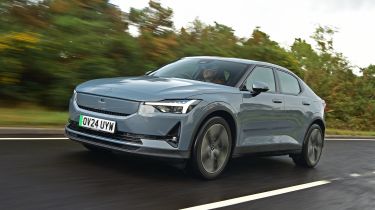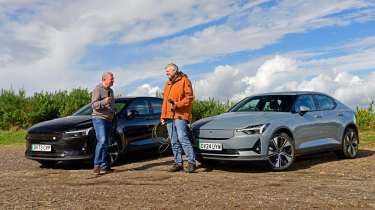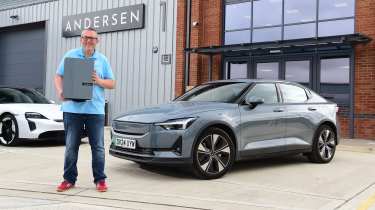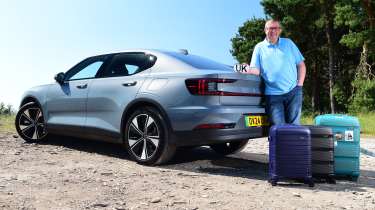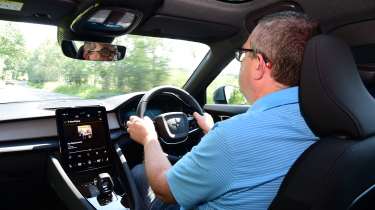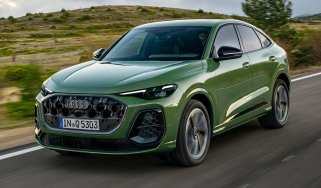Polestar 2 Long Range Single Motor long-term test: executive EV is tainted by tech bugs
Fleetwatch: the Polestar 2's infotainment system is still causing some problems
Our Polestar 2 Long Range Single Motor has ‘glitched’ a handful of times in the past few weeks – including the central touchscreen strobing rapidly on and off on one journey, while on another the GPS showed us stuck in the Heathrow long-term car park for the entire 30-mile drive home. Normality returns after a system reset, so it’s an occasional frustration that hasn’t dented our enthusiasm for the car.
Third Fleetwatch
The Polestar 2 has ‘glitched’ a handful of times in the last few weeks – including the central touchscreen strobing rapidly on and off on one journey, while on another the navigation system showed us stuck in the Heathrow long-term car park for the entire 30-mile drive home. Normality returns after a simple system reset, so for the moment it’s merely an occasional frustration that hasn’t dented our overall enthusiasm for the car.
Polestar 2 Long Range Single Motor: third report
Two of our contributors compare their pair of Polestars
- Mileage: 7,467
- Efficiency: 3.8 miles per kWh
I’m not one to claim that swanning about in a high-performance electric car weighing two tonnes is in any way saving
the planet, but thanks to my new Pod Point Solo 3S wallbox and cheap-rate night-time electricity, I’m saving myself plenty of cash.
More reviews
Car group tests
- Polestar 2 vs Tesla Model 3 twin test review: EV titans go head-to-head
- BMW i4 vs Polestar 2 vs Tesla Model 3: 2022 group test review
In-depth reviews
Long-term tests
Road tests
- New Polestar 2 Dual Motor Performance Pack 2024 review: flagship model packs a punch
- New Polestar 2 Long Range 2023 review
- New Polestar 2 BST Edition 270 review
Used car tests
It’s fair to say my Polestar 2 Long Range Single Motor (LRSM) doesn’t encourage use of more sustainable options, particularly when a trip to the shops costs less than the plastic shopping bag I’d inevitably forget to take out of the car boot if I chose to hop on the bike.
Thanks to a chunky 82kWh battery, I can confidently get from one side of the M25 to the other and home again – a 200-mile round trip I make frequently – on a single charge without a hint of range anxiety, and all for around a fiver. Happy days!
Fellow Auto Express contributor Steve Sutcliffe is a flat-dweller with no home charging options for the thirstier twin-motor Polestar he’s coincidentally driving, and finds my carefree approach to burning kilowatts galling. We met up recently to compare notes, and I was struck by his tendency to optimise settings like the one-pedal driving mode and climate control for efficiency, whereas I blithely focus on comfort.
Off-peak electrons at 8.5p/kW are still the most compelling argument for EVs, along with the ease of sticking a plug in every few days on the drive instead of going to the petrol station. Thanks to the Polestar’s impressive maximum range (330 or so miles the way I drive it), I’ve only had to interact with the public charging system four or five times in the couple of months I’ve had it, and three of those have been mildly inconvenient, thanks to two charger faults and one queue-jumper. Not encouraging, it must be said.
The car itself has performed faultlessly, and is very nice indeed to drive, with a compelling mix of turbine-like overtaking performance and a well controlled ride that belies reports I’ve seen complaining it’s too hard. Plus the interior is comfortable and extremely refined, albeit a touch dreary to look at.
Steve shares my low opinion of the weird microfibre-style panel coverings that act like a cheese-grater – every touch of hand or knee leaves an unpleasant residue of visible skin cells, which is doubly unpleasant when it’s someone else’s. We both also think it’s daft that Polestar hasn’t fitted a rear wiper.
Second Fleetwatch
Calculations indicated our London Congestion Charge-exempt Polestar 2 would cost £2 in off-peak electricity to drive to the Towcar of the Year Awards last month, plus £20 for parking in Mayfair. Driving my diesel Merc would have cost £27.50 in ULEZ and Congestion Charge fees, plus around £15 in fuel, for a total of £42.50. Taking the train? £30.60 for the ticket, a tenner for parking and £5.50 for the tube. No guesses how I travelled!
First fleetwatch
Our Polestar 2 LRSM returned from former keeper John McIlroy’s French jaunt, just in time to miss my own trip to Germany. We used the campervan, leaving me just a few days to get used to the EV, and to play with my new charger. With accounts set up and apps installed, it’s been an effortless transition to my first electric ‘daily driver’, along with the joy of 8.5p/kWh overnight charging!
Polestar 2 Long Range Single Motor: second report
We find a suitably premium charger for our classy EV
- Mileage: 4,025
- Efficiency: 4.4 miles/kWh
We've all heard about the ‘barriers’ to electric car adoption – the costs of the cars, concerns about range, worries over public charging. But as many of these are broken down, could the next glitch on the horizon be the aesthetics of home charging points?
For someone buying the cheapest electric car they can find, this might not be an issue. But for well heeled customers about to make the jump, the appearance (and experience) of a box that’ll be stuck to their house morning, noon and night could swing the deal.
That’s where Andersen comes in. The UK-based chargepoint company has carved out its own niche with its A2 and A3 units, offering a customisable premium finish, its own installation service and a self-built app that promises integration with almost all of the major energy companies’ tariffs.
And that’s how we find ourselves outside an industrial unit near Bedford with our long-term Polestar 2 Long Range Single Motor. As well as offering front panels made from wood, a number of different painted metals and even carbon fibre weave, Andersen claims it can match a chargepoint to any shade you’d like. This seemed like an interesting challenge to us, and one befitting of the Polestar’s uber-cool image.
More style-conscious buyers of cars like the 2 and the usual Teslas are probably the starting point for Andersen, whose units start at just under £1,000, plus installation. But the company has already tailored chargepoints and installations for owners of the Rolls-Royce Spectre.
“The custom colour isn’t for everyone,” admits Andersen’s chief operations officer, Gary Pearson. “But it’s quite important for us, as a brand, to be able to offer it. This ultimate level of configurability filters through to those who are mixing and matching from the regular palette.”
Other selling points include the app and tariff integration, and the fact that three quarters of the company’s suppliers, as well as its manufacturing base, are in the United Kingdom. Pearson is quick to point out that this has helped them to match our 2’s Thunder Grey metallic paint. “We work closely with a supplier on that and they’re only a few miles away,” he explains. “They’re able to just drive samples over to us here, cutting down time and streamlining the process.” A bespoke colour order takes a couple of weeks, we’re told.
It soon becomes clear, though, that our visit to Andersen HQ is going to be more interactive than we’d planned. We’re introduced to Sam Warner, an assembly technician who is connecting up sockets on our unit’s circuit board. We join Giuseppe Pepe as he puts the charger through half an hour of checks in quality control, then help Ben Noble, another assembly technician, as he finishes the build by attaching the custom fascia and our side panels. Last but not least, Stephen York, senior warehouse operative and the man who casts the final eye over the units, gets us to fill in the official certificate and sign off our charger.
We still haven’t actually seen our unit beside the Polestar, but when we carry it out to the car park, it’s immediately clear that it’s an excellent match. “The split on custom colours is interesting,” Pearson tells us. “Some buyers want their facia to blend into the background; others want it to match their vehicle or garage door; and a few customers have actually chosen something that really stands out.” We’re glad, in a way, that Thunder Grey is a pretty neutral shade (it goes nicely with the Highland Green sides), although it’s still impressive to see the metallic fleck in the fascia’s finish.
It’s a premium charger for a premium car – because our day-to-day experience of the Polestar is only confirming our initial view that this model has matured nicely since its introduction back in 2020. Peak summer temperatures have seen its battery range easily topping 330 miles on a single charge – a bit off the official number, but still deeply impressive when motorways are involved.
True, the ride quality isn’t flawless but, the occasional leaden moment aside, it has proven better than we’d expected, particularly at higher speeds. And when you combine this with that efficiency and a hefty battery, plus beautifully integrated cabin tech, you end up with an accomplished long-distance tool.
Polestar 2 Long Range Single Motor: first report
Our EV goes in at the deep end with a family trip to Normandy
- Mileage: 2,010
- Efficiency: 4.5 miles/kWh
Most long-term test vehicles get a honeymoon period – a few weeks filled with gentle runs around town, not to mention a couple of evenings spent with its custodian exploring the infotainment system, finding out what every button does and nailing down basic functions.
None of that has been possible with our latest arrival, though, because less than a week after it arrived, our new Polestar 2 was thrown into use on a family holiday – the first time, too, that I’ve taken an electric vehicle across the English Channel.
We’ve run a Polestar 2 before here at Auto Express, but that was the pre-facelift Dual-Motor version, complete with a hefty Performance Pack that added thousands to the list price. So we jumped at the chance to try the more modest Long Range Single Motor version in 2024-model year guise; it switched to rear-wheel drive, for starters, but also got a boost in power.
As it stands, then, our 2 has a 75kWh (net) battery pack that can deliver just over 400 miles of range on the WLTP test cycle, while providing power to a single 295bhp motor. That improved efficiency – helped by the lack of a second motor but also by software updates – was put straight to the test, with family onboard and a boot reasonably full of suitcases for a week in Normandy.
I let the ferry take most of the strain, picking the Portsmouth-to-Caen route, but even so, I was impressed to get from home to the port, a 55-mile early-morning trip, in barely an hour and with 85 per cent of the battery remaining suggesting a real-world achievable figure of more than 360 miles.
There was lots in that first journey abroad to trip the 2 up – and yet it emerged from the gates at Portsmouth a week later with the entire McIlroy family enthusing about it. The cabin is nicely judged for a small family and the boot is both sizeable and clever, with bags of space beneath the floor.
The in-car tech is slick, thanks to its full Android Auto operating system and integrated Googleness, and the interior finish is hard to fault. That power figure means it’s easy for the 2 to be as brisk as required, and even the ride, while a little wooden and brittle at times, is generally compliant enough; certainly more so than I remember it being on early Dual-Motor cars.
And living with the car in France proved remarkably easy, thanks to the Octopus Electroverse charging account that comes with my home-energy provider, mixed with Polestar’s own charging subscription. Between these two services, I had access to pretty much every public charger I could use, and often with a discounted rate – handy, given that we weren’t able to charge overnight where we were staying. That encouraging range figure was borne out on French roads too, thankfully, with well over 4.5 miles per kWh regularly possible.
The list price of our car may be less than £50k, but it does come with a couple of packs that take it up to almost £55k. First up is the Pilot Pack, which brings driver-assistance functions such as blind-spot monitoring and adaptive cruise control, plus features such as cornering lights, pixel LED headlamps and automatically dimming side mirrors.
This suite of extra features costs £2,000, but the Plus Pack is double that price. For this you get a Harman Kardon stereo, heating on the windscreen washer nozzles, the rear seats and the steering wheel, a panoramic roof, electric adjustment on the front seats, the trick rear cargo holder and a 15W wireless smartphone charger.
This is a fair bundle, but it also includes a heat pump. It seems a bit cheeky of Polestar to put that useful technical feature into a pricey pack that’s mainly about niceties and a more pleasant cabin environment. It’s interesting to note that along with small gains in efficiency, the updates for 2025-year models include a wider range of packs that allows greater separation in this area.
| Model: | Polestar 2 Long Range Single Motor |
| Rating: | 4.5 stars |
| On fleet since: | May 2024 |
| Price new: | £48,950 |
| Powertrain: | 1x e-motor, 295bhp, 75kWh (net) battery |
| CO2/tax: | 0g/km/£0 |
| Options: | Thunder metallic paint (£900), Pilot Pack (£2,000), Plus Pack (£4,000) |
| Insurance*: | Group: 25 Quote: £1,900 |
| Mileage: | 7,467 |
| Efficiency: | 3.8 miles/kWh |
| Any problems? | None so far |
